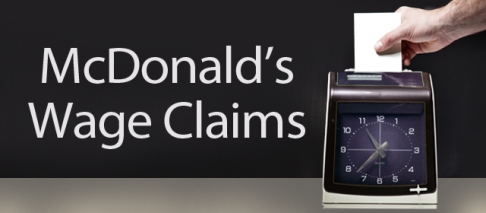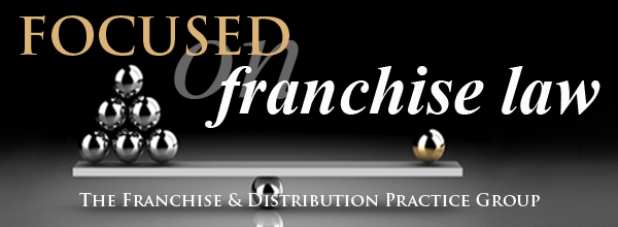Franchisor 101: Ostensible Agency Victory; and Technical Disclosure Violations

bkurtz@lewitthackman.com
dgurnick@lewitthackman.com
tgrinblat@lewitthackman.com
swolf@lewitthackman.com
msoroky@lewitthackman.com
kwallman@lewitthackman.com
tvernon@lewitthackman.com
March 2017
Tal Grinblat Recognized
Once again, Tal Grinblat will be named a 2017 Legal Eagle in franchising, by Franchise Times Magazine. He has been designated as such by his professional peers and the editorial board of the publication each year since 2014. The magazine will publish the list in April.
FRANCHISOR 101:
Ostensible Agency Victory

 A California federal judge dealt a major blow to employees of a Bay Area McDonald’s in their effort to hold the franchisor responsible for its franchisee’s alleged failure to pay wages and provide meal and rest breaks. The ruling shut the door on the plaintiffs’ argument that franchisor McDonald’s could be liable for its franchisees’ labor code violations based on an “ostensible agency” relationship.
A California federal judge dealt a major blow to employees of a Bay Area McDonald’s in their effort to hold the franchisor responsible for its franchisee’s alleged failure to pay wages and provide meal and rest breaks. The ruling shut the door on the plaintiffs’ argument that franchisor McDonald’s could be liable for its franchisees’ labor code violations based on an “ostensible agency” relationship.
In Salazar v. McDonald’s Corp., the court previously concluded the franchisor was not liable as a joint employer with the franchisee or as the franchisee’s principal under an “actual agency” rationale, and that the crew workers’ remaining theory that the fast-food giant “ostensibly” controlled their wages was not amenable to class treatment.
With the workers’ remaining theory against McDonald’s disposed, franchisors who do not directly hire, fire or pay franchisee workers, or control their hours or working conditions, can take a cue from McDonald’s to defeat similar “ostensible agency” claims.
In “ostensible agency,” the alleged agent “appears” to a reasonable observer to be acting on behalf of a principal. This appearance alone is enough to create liability for the principal party, assuming it bears some responsibility for allowing the appearance to exist. Previously, the crew workers declared that it appeared to them that they and the franchisee worked for McDonald’s, with the franchisee acting as McDonald’s agent to employ them.
Under California law, an “employer” is one who “directly or indirectly, or through an agent or any other person, employs or exercises control over the wages, hours, or working conditions of any person.” The employees argued that the clause “through an agent” was sufficient to render even McDonald’s, which only appeared to act as a principal through a franchisee agent, an “employer”.
However, the court ruled that the phrase “employs or exercises control over” indicated that to be an employer under California law, there must be actual control, not just the appearance of it.
The crew workers also contended that California wage laws broadly favor workers and that it would advance these goals to adopt their ostensible agency interpretation. The court rejected this argument because it would amount to rewriting the law. Moreover, the argument presumed that McDonald’s could remedy the alleged wage violations, a claim the court rejected.
A prudent franchisor facing claims that it shorted a franchisee’s employees’ pay, rest and meal breaks can look to McDonald’s for guidance when the employee asserts a belief that he or she was working for the franchisor.
Read: Salazar v. McDonald’s Corp.
FRANCHISEE 101:
Technical Disclosure Violations

The consequences to an unwitting franchisor can be severe when it fails to provide disclosure documents required by franchise law. Most franchise laws provide for rescission of the franchise agreement, allowing the franchisee to “unwind the deal” by enabling it to recover all monies it paid in connection with the franchise sale.
But what if the violation was merely a “technical” one because the franchisee did not suffer damages from non-disclosure?
The Sixth Circuit court confronted this question in Lofgren v. Airtrona Canada. After affirming that a sanitation services franchisor violated the Michigan Franchise Investment Law (“MFIL”) when it failed to provide a franchisee with a disclosure statement, the court confirmed that rescission of the franchise agreement was the proper remedy under MFIL for this disclosure violation.
Plaintiff Brian Lofgren purchased equipment for a vehicle-deodorizing and sanitizing business. After Lofgren’s business was struggling, he sued the franchisor Airtrona Canada and its sales representative, alleging that he was entitled to rescission and restitution because their failure to provide the disclosure statement violated the MFIL. Upon the Court’s finding that Logfren’s agreement did establish a franchise, the sales representative argued that rescission was a proper remedy for a violation of the MFIL only when the violation directly causes financial losses.
In rejecting this argument, the Sixth Circuit quoted directly from the MFIL, which states that “[a] person who offers or sells a franchise in violation of [the MFIL’s disclosure requirements] is liable to the person purchasing the franchise for damages or rescission.” The court noted that, although the absence of a disclosure statement did not directly cause the franchisee’s financial struggles, there was no requirement under the MFIL to establish causation; it merely says that rescission is permitted if the franchisor fails to provide the disclosure statement.
The court observed that lower courts may choose not to permit rescission if considerations of fairness are in the franchisor’s favor, such as where the franchisor inadvertently provided disclosure a few days late. In this case, however, the franchisee met his franchise requirements and took no improper actions. As a result, Lofgren had the right to rescission and restitution for even a “technical” disclosure violation, without needing proof that the failure to supply a disclosure statement actually caused his losses.
If you are a franchisee looking to “unwind” your Franchise Agreement, consider whether the franchisor dotted all ‘i’s and crossed all ‘t’s when you started the relationship. If not, there may be a law out there that will grant your wish.
Read: Lofgren v. Airtrona Canada, et. al.
This communication published by Lewitt Hackman is intended as general information and may not be relied upon as legal advice, which can only be given by a lawyer based upon all the relevant facts and circumstances of a particular situation. Copyright Lewitt Hackman 2017. All Rights Reserved.
>
